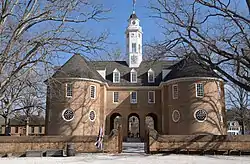Fourth Virginia Convention
The Fourth Virginia Convention was a meeting of the Patriot legislature of Virginia held in Williamsburg in December 1775.

Presiding officer
Background
This Convention followed the Third Virginia Convention, which recessed on August 26, 1775. Peyton Randolph, who presided over the first three Conventions, died on October 22. On November 14th, the governor John Murray, 4th Earl of Dunmore issued Dunmore's Proclamation. This declared that Virginia was in a state of rebellion and would be placed under martial law, and promised freedom to any slaves to join the British armed forces in suppressing the revolt.
Meeting

where the Fourth Convention of 1776 met
Edmund Pendleton was elected to preside over the Convention. The Convention authorized the raising of additional regiments of troops. It further, in response to Dunmore's Proclamation, offered a ten-day amnesty to any escaped slaves, but promised that any slaves caught serving the British armed forces after the expiration of the amnesty would be summarily hanged.[1][2]
See also
References
- "WPA Guide to Virginia: Virginia History". American Studies at the University of Virginia. Archived from the original on 18 April 2016. Retrieved 10 April 2016.
- "Virginia in the Revolutionary War". Retrieved 9 April 2016.
